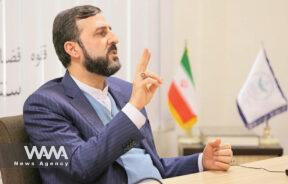Iran’s Conditions for Engagement with Syria’s New Government
WANA (Dec 17) – Iranian Foreign Minister, Seyed Abbas Araghchi, stated that Iran’s “red line is the preservation of regional countries’ political borders and national sovereignty.” Writing for a Lebanese media outlet, he noted: “Contrary to the media atmosphere, I did not find developments in Syria unexpected; rather, they have real underlying causes with a long 12-year historical background.”
In his article for An-Nahar, Araghchi elaborated: “The seemingly rapid and surprising developments in Syria indeed have deep-rooted causes dating back at least 10-12 years.”
He added: “Over the past 14 months, constant Zionist regime attacks on Syria’s defensive infrastructure were aimed at weakening its government. Long before, by analyzing Israeli regional movements—particularly after October 7—we concluded that the situation for the Syrian government would become difficult, posing fundamental challenges to continued governance. This assessment was conveyed clearly to Syria’s leadership in September this year.”
Flexibility in Political Initiatives
The Foreign Minister highlighted: “It was expected that decision-makers in the Syrian government would have earlier demonstrated flexibility toward diplomatic initiatives and proposals for including the opposition in power-sharing, which did not happen.” He stressed that Iran, since the Astana Process began, has always engaged in trilateral negotiations with Turkey and Russia, while also maintaining direct contact with the Syrian opposition through hours of dialogue and exchanges of views.
He emphasized: “Our support for Syria is grounded in the formal request by its legitimate government and aimed at preventing the dominance of terrorism and the violent extremism of groups like Daesh.”
Iran’s Red Line and Approach to Diplomacy
Araghchi reiterated Iran’s red line: “As I mentioned before my last trip to Syria at Tehran airport, Iran’s red line is the preservation of political borders and national sovereignty of regional countries. Unlike the United States, which occupies a significant portion of Syria without any legal basis or authorization, Iran has only entered Syria at the request and with the permission of its government.”
On engaging with Syria’s leadership, he stated: “Our preference for dialogue with the government in power is through official channels and diplomatic frameworks. This is contingent on necessary coordination and guarantees in line with the Vienna Convention. Ensuring the technical Foreign Ministry team and appointed diplomats’ presence will include assessing damages, preparing embassies in Damascus, and reopening the consulate in Aleppo. Simultaneously, political evaluations and discussions with Syrian officials will commence.”
Expectations from Syria’s New Leadership
Araghchi underlined Iran’s expectations, stating: “We anticipate a new government in Syria—like any sovereign nation—reflecting the will of its people, including all capable individuals and groups who represent Syrian society. This government must pave the way for national dialogue and build a united and cohesive Syria within its political borders.”
Support for the Anti-Zionist Front
Regarding Hezbollah, Araghchi wrote: “For Iran, Hezbollah has always been an influential social force, a defending military power, and an effective political entity preserving national unity, security, and Lebanon’s defense strength. This has always defined our primary perspective on Hezbollah.”
He continued: “Hezbollah has played an essential role, alongside other Arab and Muslim nations, in defending Palestine and resisting Israel’s aggressive and limitless expansionism. The sacrifices of Hezbollah and Lebanon’s people place the region’s nations in debt to their efforts. Iran stands with the forces of resistance in the anti-Zionist front, firmly supporting all Islamic and Arab powers aligned in this axis.”
Responsibility in Shaping the Region’s Future
Araghchi stressed: “Resistance against Israel’s continued occupation and expansionism is not just an ideological matter but a fundamental reality and the most critical tool for maintaining security and stability across the region.”
He added: “The destiny of West Asia is shaped by the actions of each regional country. We all share the responsibility not to make wrong choices during Syria’s challenging times that could lead to bitter consequences.”
A Call for Regional Dialogue
Highlighting the region’s unity, Araghchi wrote: “A destructive force has targeted the people of this region with extreme brutality for over a year. Whether we are in Tehran or Cairo, Beirut or Riyadh, Ankara or Abu Dhabi, Doha or Baghdad, we must recognize that we are a historically diverse region with languages such as Persian, Arabic, Turkish, Kurdish, Coptic, and Aramaic, and we must engage in dialogue with each other.”
He concluded: *“The language of this dialogue is irrelevant; what matters is finding its principles. People across the region desire peace and cooperation, hoping that major powers understand this message and act responsibly regarding their past mistakes. To the world looking ahead, I would say this: ‘Rectifying history is an opportunity that the near future offers to the global community.’”












